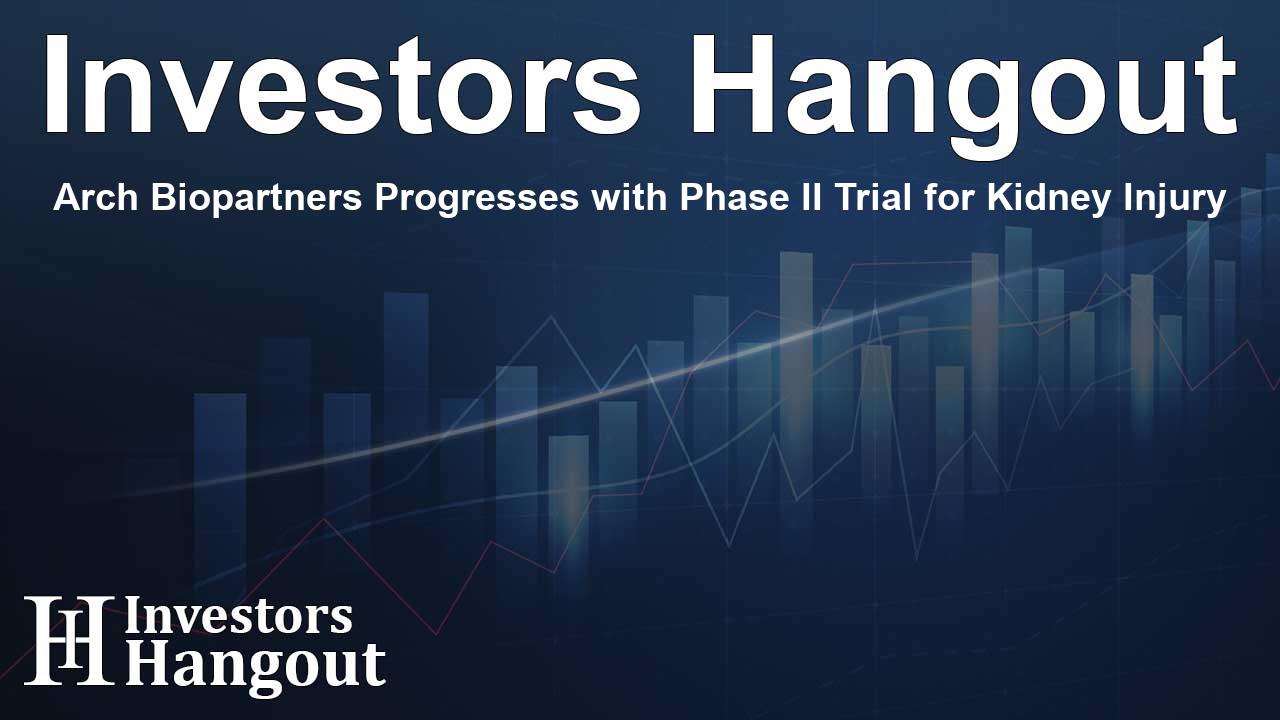Arch Biopartners Progresses with Phase II Trial for Kidney Injury

Arch Biopartners Advances Phase II Trial for LSALT Peptide
Arch Biopartners Inc., a company dedicated to innovative biomedical research, has announced an important milestone in its clinical journey. The recent approval from Alberta Health Services signals the green light for the Phase II trial of the LSALT peptide, which is aimed at preventing and treating acute kidney injury (AKI) linked to cardiac surgeries.
Preparations Underway for Patient Recruitment
The clinical team at the University of Calgary's Cumming School of Medicine is putting the finishing touches on preparations and training necessary for patient recruitment, which is set to begin shortly. Additionally, healthcare teams at the University Health Network and Unity Health Toronto are finalizing ethical and hospital approvals to commence recruitment at local hospitals.
Overview of the CS-AKI Clinical Trial
This Phase II trial represents a significant step forward in addressing the prevalence of cardiac surgery-associated acute kidney injury, which affects a noteworthy percentage of patients. It is an international, multi-center study with a robust design, featuring randomization, double-blinding, and a placebo-controlled setup. The target is to enroll 240 patients, providing a comprehensive view of the LSALT peptide's effectiveness.
Focusing on Acute Kidney Injury
The primary aim of the trial is to measure the percentage of participants who experience AKI within a week post-surgery. This will be evaluated against the KDIGO criteria, ensuring a meticulous approach to gauging the treatment's efficacy.
Understanding Acute Kidney Injury and LSALT Peptide
Acute kidney injury is a serious complication that can arise following procedures such as coronary artery bypass grafting and other cardiac surgeries where the risk of injury is heightened. The trajectory of recovery for patients with AKI can be challenging, and the condition is associated with increased morbidity and mortality rates. Currently, the market lacks a therapeutically effective solution to prevent AKI in such settings, heightening the need for innovative treatments.
The Role and Mechanism of LSALT Peptide
LSALT peptide stands as a key candidate in Arch Biopartners’ drug development portfolio, particularly for its role in preventing inflammation and subsequent organ injuries in the kidneys, lungs, and liver. The peptide targets the dipeptidase-1 (DPEP1) pathway, crucial in mitigating damage caused by ischemia-reperfusion injury—a primary mechanism of AKI. Preliminary studies demonstrate the peptide’s ability to prevent renal injury, setting a solid foundation for its application in this clinical trial.
Arch Biopartners' Commitment to Innovation
As a forward-thinking organization, Arch Biopartners remains steadfast in its mission to innovate in the realm of acute organ injuries. With a pipeline of drug candidates designed to reduce inflammation in vital organs, the company addresses a critical need in modern medicine that many existing treatments overlook.
Exploring the Incidence of CS-AKI
The reported prevalence of cardiac surgery-associated AKI can reach up to 30%, which underscores the urgency of effective preventive solutions. Arch Biopartners aims to alter this challenging narrative with its focused research and clinical trials. The implications of successfully managing CS-AKI extend far beyond individual patient outcomes, potentially reshaping treatment protocols involved in cardiac surgery.
Conclusion and Future Directions
As Arch Biopartners moves forward with the Phase II trial, the implications of their research are substantial. With LSALT peptide representing hope for many patients experiencing AKI after cardiac surgery, the upcoming months are poised to be critical for the company. The ongoing clinical trial could pave the way for a much-needed therapeutic option, reflecting Arch’s commitment to addressing significant medical challenges with innovative solutions.
Frequently Asked Questions
What is the LSALT peptide?
The LSALT peptide is Arch Biopartners' lead drug candidate aimed at preventing and treating kidney inflammation and injury during cardiac surgeries.
What does the Phase II trial involve?
The Phase II trial will evaluate the effectiveness of the LSALT peptide in preventing acute kidney injury in 240 patients undergoing cardiac surgery.
Why is acute kidney injury a concern?
AKI can lead to serious complications and increased mortality rates, especially in patients who have undergone cardiac surgeries, making prevention critical.
What is the mechanism of action for LSALT peptide?
LSALT peptide works by targeting the dipeptidase-1 (DPEP1) pathway to prevent renal inflammation associated with ischemia-reperfusion injury.
How can I learn more about Arch Biopartners?
For more detailed information on Arch Biopartners’ research and drug development platform, you can visit their official website.
About Investors Hangout
Investors Hangout is a leading online stock forum for financial discussion and learning, offering a wide range of free tools and resources. It draws in traders of all levels, who exchange market knowledge, investigate trading tactics, and keep an eye on industry developments in real time. Featuring financial articles, stock message boards, quotes, charts, company profiles, and live news updates. Through cooperative learning and a wealth of informational resources, it helps users from novices creating their first portfolios to experts honing their techniques. Join Investors Hangout today: https://investorshangout.com/
Disclaimer: The content of this article is solely for general informational purposes only; it does not represent legal, financial, or investment advice. Investors Hangout does not offer financial advice; the author is not a licensed financial advisor. Consult a qualified advisor before making any financial or investment decisions based on this article. The author's interpretation of publicly available data shapes the opinions presented here; as a result, they should not be taken as advice to purchase, sell, or hold any securities mentioned or any other investments. The author does not guarantee the accuracy, completeness, or timeliness of any material, providing it "as is." Information and market conditions may change; past performance is not indicative of future outcomes. If any of the material offered here is inaccurate, please contact us for corrections.